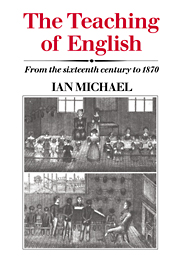Book contents
- Frontmatter
- Contents
- List of tables
- Preface
- 1 The enquiry: scope, method, texts
- 2 Reading, spelling, pronunciation: the elements
- 3 Reading, spelling, pronunciation: the skills
- 4 Interpretation: literature presented
- 5 Interpretation: literature taught
- 6 Expression and performance
- 7 Linguistic control
- 8 English: the development of a subject
- Abbreviations
- Bibliography 1
- Bibliography 2
- Bibliography 3
- Bibliography 4
- Index
5 - Interpretation: literature taught
Published online by Cambridge University Press: 05 June 2012
- Frontmatter
- Contents
- List of tables
- Preface
- 1 The enquiry: scope, method, texts
- 2 Reading, spelling, pronunciation: the elements
- 3 Reading, spelling, pronunciation: the skills
- 4 Interpretation: literature presented
- 5 Interpretation: literature taught
- 6 Expression and performance
- 7 Linguistic control
- 8 English: the development of a subject
- Abbreviations
- Bibliography 1
- Bibliography 2
- Bibliography 3
- Bibliography 4
- Index
Summary
The teaching of literature: eighteenth century, from 1770
In the 1770s there was a quite marked change in teachers' attitudes to literature. Not only did they now reckon to teach it, as well as present it, but they began to see that it had value for ordinary children as well as for those in educated homes. J. Butler's Proposals, 1772, look ahead to both developments. He analyses society into seven classes: (i) ‘those bred to independent fortunes’; (ii) those ‘intended for the professions’; (iii) the army; (iv) mercantile employment; (v) mechanic trades; (vi) labour; (vii) service. The children of labourers, who may start work at the age of seven or eight, can learn to read if they are well taught, and they would be better taught if the mistresses were better paid. All children should learn to read, because only then would employment opportunities be opened up and the dissociation between labour and learning ended. Their reading should not be solely vocational:
1722 ‘Many of the passages of Poetry, the most admired by the best judges, have been such as have touched the bosoms of the very Vulgar. It is not with coarse humour only that these are pleased, but often with true pleasantry and peculiarities of character. Their Souls are, too, susceptible of the tenderest sensations from stories, movingly told.’
(p. 84)More emphasis on the teaching of literature meant more emphasis on teaching children to understand what they read.
- Type
- Chapter
- Information
- The Teaching of EnglishFrom the Sixteenth Century to 1870, pp. 183 - 267Publisher: Cambridge University PressPrint publication year: 1987

